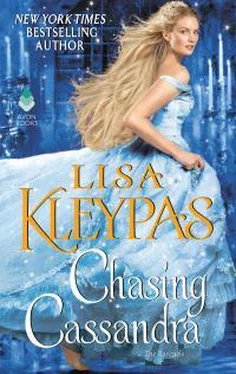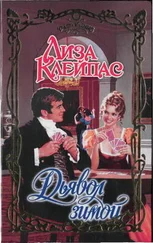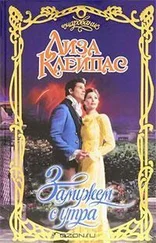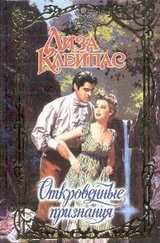In the first fortnight after their honeymoon, Cassandra had taken charge of the house at Hyde Park Square with an impressive attention to detail. Despite all her talk of lingering and being a lady of leisure, she was a whirlwind in disguise. She knew what she wanted, and how to give directions, and how to approach the complex web of responsibilities and relationships that comprised a household.
An assistant had been hired for the elderly cook, and new dishes were already being served at the table. After reviewing the household routines with Mrs. Dankworth, it was agreed that two additional housemaids and an extra footman would be hired to reduce the staff’s workload in general. They had too little time off per week, Cassandra had explained to Tom, which was exhausting and dispiriting. She and the housekeeper had also agreed to soften a few rules to make the servants’ lives less codified and uncomfortable. For example, the housemaids would no longer be obligated to wear the silly popover shaped caps that served no purpose other than to designate them as housemaids. Such small concessions seemed to have buoyed the general atmosphere of the house noticeably.
The extra parlor Cassandra had commandeered for her private office was filled with sample books of paint, paper, carpeting and fabric, as she had decided to replace portions of interior decorating she considered shabby or outdated. That included the servants’ quarters, where worn bed linens, blankets and towels had been replaced, as well as several pieces of rickety or broken furniture. A better quality of soap would be ordered for their personal needs, instead of the coarse soap that made the skin dry and the hair brittle.
It annoyed Tom that there were details about the lives of his household staff he’d never been made aware of, nor had he thought to ask about. “No one ever mentioned that my servants were being given the cheapest possible soap,” he had told Cassandra with a scowl. “The devil knows I’ve never been a miser.”
“Of course not,” she soothed. “Mrs. Dankworth was only trying to be economical.”
“She could have told me.”
Diplomatically, Cassandra said, “I’m not sure she felt comfortable talking to you about household soap. You seem to have told her you didn’t want to be bothered by the details, and to use her own judgment.”
“Clearly my opinion of her judgment was too high,” Tom muttered. “I’d rather not have my servants scoured raw with caustic soda and petroleum soap.”
In the ferment of activity, Bazzle was hardly forgotten. Cassandra had taken him to a dentist for a professional cleaning, and then to an oculist who administered an eye examination and pronounced his vision excellent. After that, she’d taken him to visit a tailor who had measured him for new clothes. Although Cassandra hadn’t yet found a private tutor to bring Bazzle up to the educational level of other children his age, she had undertaken to teach him the alphabet. He’d found it dull and tiresome, until she’d purchased a set of painted alphabet blocks that featured pictures as well as letters. At mealtimes, she labored to teach him basic manners, including how to use his utensils properly.
Although Bazzle adored Cassandra, her relentless attentions were probably a large part of the reason the boy was so insistent about continuing to accompany Tom to the office in the mornings. Once a tutor was found, however, Bazzle’s visits would have to become curtailed.
“Fingers is as good as forks,” Bazzle grumbled as he went with Tom to a food stall for lunch one day. “Don’t need no utenskils, and no alphabet neither.”
“Look at it this way,” Tom said reasonably. “If you’re eating at a table beside a fellow who knows how to use his fork properly, and you can only eat with your fingers, people will think he’s smarter than you.”
“Don’t care.”
“You’ll care when they give him a better job.”
“Still don’t care,” came Bazzle’s sullen reply. “I likes sweeping.”
“What about operating a big excavating machine, and digging up an entire street instead of sweeping it?”
To Tom’s amusement, Bazzle’s expression lit up with interest.
“Me, dig up a street?”
“Someday, Bazzle, you could be in charge of a fleet of large machines. You could own companies that make new roads and dig tunnels. But those are the jobs that go to men who use forks and know their alphabet.”
On the day Tom brought Cassandra to visit his offices, he hadn’t expected that all businesslike decorum would have been so utterly abandoned by everyone from department heads down to the secretaries and accountants. They crowded around her and fawned as if she were visiting royalty. Cassandra was gracious and charming amid the crush, while Bazzle clung to Tom’s side and looked up at him with mild alarm. “They all gone orf their chumps,” the boy said.
Tom kept a protective arm around him, reached for Cassandra, and managed to usher them both to his private offices on the top floor. As soon as they reached safety, Bazzle looked up at Cassandra with his arms locked around her hips. “I got squashed,” he told her.
She smoothed his hair and straightened his cap. Her reply was forestalled as someone approached and stumbled against a chair, nearly tripping.
It was Barnaby, who had just entered the office and caught sight of Cassandra. Tom reached out automatically to steady him.
“Oh no,” Bazzle groaned, “not ’im too!”
Barnaby, to his credit, managed to recover his composure, but his face was infused with heightened color that electrified his wild curls until they seemed to radiate out from his head. “My lady,” he said, and bowed nervously, with a stack of ledgers and papers clutched in one arm.
“Is this the indispensable Mr. Barnaby?” Cassandra asked with a smile.
“It is,” Tom replied for his assistant, who was too befuddled to reply.
Cassandra moved forward, with Bazzle still hanging from her hip, and extended her hand. “How happy I am to make your acquaintance at last. According to my husband, nothing would be accomplished around here if it weren’t for you.”
“Is that what I said?” Tom asked dryly, while Barnaby took Cassandra’s hand as if it were a sacred object. “Barnaby,” Tom continued, “what is that stack you’re holding?”
Barnaby gave him an owlish glance. “What . . . oh . . . this stack.” He released Cassandra’s hand and hefted the pile of materials to Tom’s desk. “Information on the Charterhouse Defense Fund, sir, as well as the local businesses and residents, a summary of the pending report of the Royal Commission on London Traffic, and an analysis of the joint select committee that will vote to authorize your bill.”
“What bill?” Cassandra asked.
Tom drew her to a map of London on the wall. With a fingertip, he traced a line that went under Charterhouse Street toward Smithfield. “I’ve proposed a bill to build a connecting underground railway line to an existing one that currently ends at Farringdon.
“The proposal is currently being examined by a joint select committee of the Lords and Commons. They’ll meet next week to pass a bill that will authorize me to proceed with the line. The problem is, some of the local residents and tradesmen are fighting it.”
“I’m sure they dread all the inconvenience and construction noise,” Cassandra said. “Not to mention the loss of business.”
“Yes, but they’ll all eventually benefit from having a new station built nearby.”
Barnaby cleared his throat delicately from behind them. “Not all of them.”
Cassandra gave Tom a quizzical glance.
Tom’s mouth twisted. Resisting the urge to send Barnaby a lethal glance, he indicated a spot on the map with his fingertip. “This is a remnant of Charterhouse Lane, which was left after most of the thoroughfare was converted to Charterhouse Street. Right here, there are a pair of tenement slums that should have been condemned years ago. Each one was designed to house three dozen families, but they’re crammed with at least twice that number of people. There’s no light or air, no fire protection, no decent sanitary arrangements . . . it’s the closest thing you’ll find to hell on earth.”
Читать дальше












